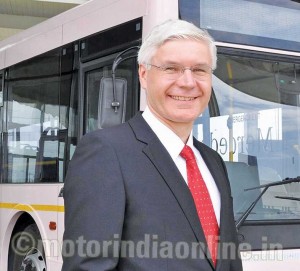Dr. Wilfried G. Aulbur, Managing Partner, Roland Berger Strategy Consultants Pvt. Ltd., emphasised the need for technology and innovative models in green manufacturing in the Green Initiative Conference organised by CII in Chennai recently.

In his presentation he said that sustainable or “green” manufacturing is an opportunity as well as a significant challenge for modern product and process companies. Pressure to be sustainable comes from all sides. Resource scarcity, climate change, population growth and import dependence are external factors that drive companies towards careful use of resources and raw materials.
Governments drive emissions norms and may incentivize sustainable investments. Competitors are creating cost and branding advantages by innovating their processes and saving energy and water. Technology opens up new business opportunities, while customers are looking for “green” products.
He said: “The global market for environmental friendly technology has exceeded EUR 2 trillion in 2011. Out of this, the bulk of the market is in energy efficiency (EUR 720 billion), sustainable water (EUR 455 billion), environment-friendly power generation and energy storage (EUR 313 billion) as well as sustainable mobility (EUR 280 billion). Manufacturing companies can address sustainability concerns by focusing on measures across the value chain, from Green Strategic Planning to Green Marketing.”
The presentation further observed that globally the transport sector accounts for 15 per cent of the greenhouse gas emissions (GHG). India is the third largest polluter after China and the US with 6.6 per cent of all global GHG emissions. While economic progress in India can’t be jeopardized, the country can’t simply follow the development path of triad nations both from an environment and a balance of payment perspectives.
Green products, i.e., vehicles with a lower GHG footprint at affordable prices or hence a key challenge for the country.
Some of the relevant technologies on alternative materials and light-weighting were also highlighted in the presentation. Together with hybridization, electric or fuel cell vehicles, etc., the technologies will have an impact on how vehicles are manufactured.
It also pointed out that green marketing is relevant due to a significantly enhanced environmental conscience of today’s consumers. According to a Greendex Survey, India has consistently ranked first among the BRIC countries as well as other advanced countries like the US and Japan in consumer consciousness about sustainable behaviour.